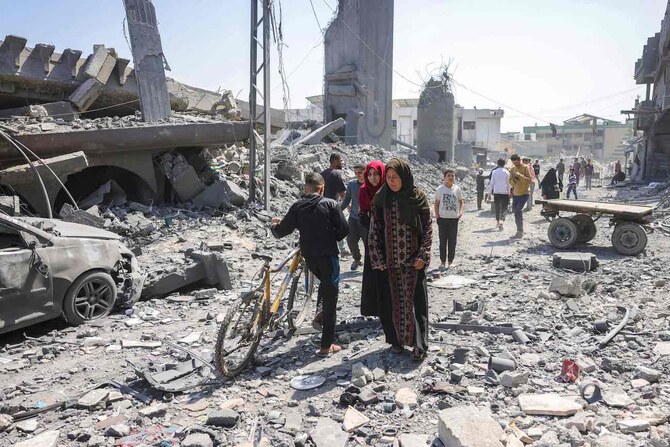NEW YORK: The UN under-secretary-general for humanitarian affairs warned the UN Security Council on Tuesday that the aid crisis in Gaza is worsening, as Israel resumed airstrikes across the territory and continued to block vital supplies.
“Overnight our worst fears materialized,” Tom Fletcher told council members.
“Airstrikes resumed across the entire Gaza Strip. (Reports) of hundreds of people killed. New evacuation orders issued by Israeli forces. Once again, the people of Gaza are living in abject fear.”
Fletcher added the situation had returned to chaos, undermining the modest gains made during a recent ceasefire.
Humanitarian efforts in Gaza were severely hampered following the resumption of hostilities, he said.
“Today, I am distressed to report that in addition to the intense airstrikes that have resumed, since March 2 Israeli authorities have cut off the entry of all lifesaving supplies — food, medicines, fuel, cooking gas — for 2.1 million people,” Fletcher said.
“Our repeated requests to collect aid sitting at Karem Shalom crossing have also been systematically rejected. No further hostages have been released. Only medical evacuations and humanitarian staff rotations continued. Even that came to a halt today.”
The blockade has worsened living conditions, with essential services such as clean water becoming increasingly scarce.
Fletcher highlighted that the shutdown of Gaza’s desalination plant has left 600,000 people without access to safe drinking water.
“The current suspension of aid and commercial materials is reversing the progress achieved during the brief ceasefire. Survival resources are now being rationed,” he said, adding that vegetable prices in northern Gaza have tripled, while bakeries have closed due to shortages of cooking gas and supplies.
The World Health Organization has warned that public health risks remain very high, including for communicable diseases resulting from overcrowding and poor sanitation.
Fletcher again raised concerns about the growing challenges facing humanitarian workers, with the new restrictions imposed on international NGOs since the Knesset legislation banning the aid agency UNRWA took effect on Jan. 30.
“UNRWA international staff are no longer able to rotate into and out of Gaza,” he said.
Fletcher said that on March 9, Israeli authorities introduced new registration rules for international NGOs delivering humanitarian aid to Palestinians in the territory. If enforced, these will impose strict conditions and significantly disrupt aid operations.
“The Israeli Knesset is also considering a bill to impose considerable taxation on donations from third states to Israeli NGOs, including humanitarian and human rights groups.
“If implemented, this would further erode the number of partners with the capacity to implement protection interventions.
“Many Israeli NGOs are engaged on legal cases involving home demolitions and forced evictions. They also provide protective presence activities related to settler violence.”
Fletcher underscored the success of the 42-day ceasefire, which allowed deliveries from more than 4,000 aid trucks per week, the release of 30 hostages, and the distribution of essential resources to over 2 million people.
“This proves what’s possible when we’re allowed to do our job,” Fletcher said. “We cannot accept a return to pre-ceasefire conditions or the complete denial of humanitarian relief.”
The UN official also expressed grave concern about escalating violence in the West Bank, where 95 Palestinians, including 17 children, have been killed since the beginning of the year, and over 40,000 Palestinians forced from their homes by Israeli military operations.
Fletcher called for immediate action, urging that humanitarian aid and commercial goods be allowed to enter Gaza, and that hostilities cease with the renewal of a ceasefire agreement.
He warned that without funding for the humanitarian response, which has received only 4 percent of the required financial support, the situation will worsen.
“Blocking food, water, and medicine for people who need them is unconscionable,” Fletcher said. “It goes against international humanitarian law and must be stopped immediately.”













